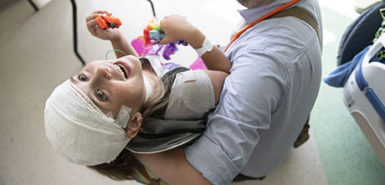
Non-epileptic seizures, also referred to as psychogenic seizures or pseudo-seizures, are devious.
These debilitating attacks are similar to epileptic seizures, which can cause uncontrollable shaking or may make people appear trance-like, as though they’re staring into space.
But while these two types of seizures share many outward characteristics, their root causes are different.
Epileptic seizures are the result of abnormal electrical activity in the brain; psychogenic seizures are most often the result of psychological trauma. There are no electrical abnormalities present, according to Shan Abbas, MD, with Spectrum Health Medical Group, one of eight physicians at Spectrum Health’s Level 4 epilepsy center.
People who experience seizures often think it’s epilepsy, when in fact it may be non-epileptic in nature. If a physician is unable to differentiate between these types of seizures, it can leave the patient without proper care, Dr. Abbas said.
Unfamiliarity with non-epileptic seizures could conceivably lead to treatment with medications that do no good. In fact, the side effects from anti-seizure medications may be harmful to some patients.
Testing
Non-epileptic seizures are most often triggered by a major psychological trauma. The inciting incident—sometimes traced to physical, emotional or sexual abuse during childhood—can create unbearable stress, ultimately manifesting as reoccurring seizures.
There is not enough talk about (non-epileptic seizures). It has been pushed under the door. It’s not something that people talk about frequently.
Non-epileptic seizures can even be a side effect of post-traumatic stress disorder, which plagues veterans who have served in war zones.
The most accurate way to determine if a patient’s seizures are non-epileptic is to have patients undergo video-EEG monitoring, preferably in an epilepsy center, Dr. Abbas said.
During a video-EEG monitoring study, the goal is to capture a person’s seizures, and to characterize them as epileptic or non-epileptic.
A trained technician will place electrodes on a person’s scalp; the procedure is painless and non-invasive. Anti-seizure medications may be carefully weaned off under a physician’s guidance so that a seizure may be provoked.
It takes time. While some patients may have seizures in only a few hours, often the testing may take a few days, and sometimes as long as a week. There’s no way to predict when the next seizure will happen.
If the machine does not detect abnormal brain activity in association with a person’s typical seizures, the patient is most likely suffering from psychogenic seizures.
Keep in mind that it’s challenging to even reach this stage of the diagnosis.
Usually, people who have seizures will see a physician, who places them on medication, Dr. Abbas said.
If the medication fails to control the seizures, it could indicate that the person is afflicted by epilepsy that is resistant to treatment with anti-seizure medications. This is the case with up to a third of persons with epilepsy.
It could also potentially mean that the person may have a diagnosis other than epilepsy. Psychogenic non-epileptic seizures is one such condition.
Treatment
After the diagnosis of non-epileptic seizures is made through video-EEG monitoring, treatment involves considerable patience and sensitivity, in addition to proper psychological counseling, Dr. Abbas said.
They need to undergo cognitive behavioral therapy, a type of counseling, to identify the triggers that are causing the seizures.
Once the likely cause has been identified, patients should be empowered to overcome their trauma. The hope is that this empowerment will prevent future seizures.
As more people learn about non-epileptic seizures, families can become more informed and ultimately more equipped to encourage their loved ones to seek help.
Dr. Abbas said he has, in fact, met people who have reached out elsewhere for help, only to be told “they are just faking.”
“Part of the challenge for (physicians) is there is not enough talk about (non-epileptic seizures),” Dr. Abbas said. “It has been pushed under the door. It’s not something that people talk about frequently.”
 /a>
/a>
 /a>
/a>
 /a>
/a>